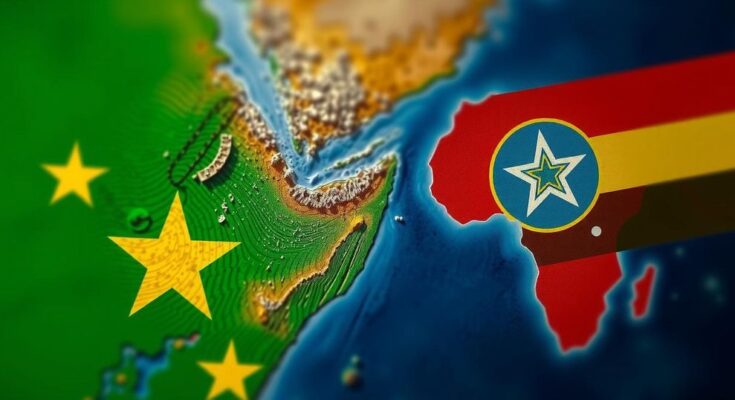This article examines how President Hassan Sheikh Mohamoud’s policies threaten stability in the Horn of Africa. His refusal to recognize Somaliland’s self-determination and efforts to block Ethiopian access to Red Sea ports endanger regional alliances and economic ties, risking conflict and instability in Somalia and Ethiopia. The need for international support for Somaliland’s right to self-determination is emphasized as crucial for peace and development in the region.
The Horn of Africa has a rich tapestry of history and politics that influence its intricate power dynamics. Currently, a significant concern arises from the actions of Somalia’s President, Hassan Sheikh Mohamoud. His administration poses substantial risks not only to the 120 million inhabitants of the Horn of Africa but also to the delicate relationships between Somalia and Ethiopia. Mohamoud’s refusal to recognize the self-determination of Somaliland and his attempts to obstruct Ethiopia’s access to important Red Sea ports could severely disrupt established alliances and incite regional hostilities, ultimately upsetting the geopolitical equilibrium. Founded after seceding from Somalia in 1991, the Republic of Somaliland has established a separate state characterized by functioning democratic institutions, peace, and economic advancement. Its strategic proximity to Ethiopia has facilitated various international agreements, notably with the UAE for managing Berbera Port. This development has solidified Somaliland’s status as a crucial economic regional player, with around 40 million Ethiopians relying on trade routes through the Red Sea. President Mohamoud’s efforts to impede these essential connections threaten to derail Somaliland’s economic progression and adversely affect Ethiopia’s stability. His policies are increasingly viewed as miscalculations that risk rekindling tensions within the Horn of Africa, particularly with Ethiopia, a nation pivotal for regional stability. Ethiopia’s reliance on secure access to Red Sea ports has been integral to its geopolitical strategies, and Mohamoud’s actions could exacerbate antagonism. The internal instability of Somalia complicates this matter further. Shadowed by decades of civil discord, terrorism, and foreign intervention, Somalia continues to rely on African Union forces to combat the Al-Shabaab insurgency. In contrast, Somaliland has thrived under peace and development. President Mohamoud’s fixation on weakening Somaliland rather than fostering stability within his own nation threatens to extend Somalia’s plight, hindering the establishment of a harmonious governance structure in the southern region. Moreover, the geopolitical landscape becomes precarious with Egypt’s involvement. Mohamoud’s alignment with Egypt within the tripartite agreement encompassing Egypt, Eritrea, and Somalia introduces a potential shift in the regional balance. Egypt, motivated by its interests in the Nile, may exploit Mohamoud’s policies as a tactical maneuver against Ethiopia, potentially igniting proxy conflicts that destabilize southern Somalia and derail regional development efforts by decades. Consequently, it is imperative for the international community to advocate for Somaliland’s right to self-determination and uphold economic cooperation with Ethiopia. Strengthening Somaliland’s economic relations with Ethiopia, involving potential trade opportunities for 120 million people, could foster prosperity across the region. It is vital to prevent jealousy, religious biases, or personal agendas from obstructing this advancement. In conclusion, President Mohamoud’s current policies jeopardize the prospects for peace and stability within the Horn of Africa. His disregard for Somaliland’s independence and persistent opposition to Ethiopia could instigate enduring conflict, thereby redefining the region’s geopolitical landscape for years to follow. For the sake of lasting peace and development, it is essential to recognize and safeguard the partnership between Somaliland and Ethiopia.
The dynamics of the Horn of Africa, historically and politically intricate, are currently under strain due to the actions of Somalia’s President Hassan Sheikh Mohamoud. His approach poses a risk not only to the lives of millions but also threatens the crucial relationship between Somalia and Ethiopia. The Republic of Somaliland’s secession from Somalia in 1991 introduced a new variable into this complex equation by establishing itself as a self-governing entity with democratic institutions and economic development, positioning itself as a vital economic player in the region. Meanwhile, Ethiopia’s dependence on secure access to Red Sea ports underscores its geopolitical strategies for regional stability. Together, these elements foster an environment ripe for conflict if not managed with care.
In summary, the policies of President Hassan Sheikh Mohamoud present a significant risk to the stability and future of the Horn of Africa. His failure to acknowledge Somaliland as a separate entity, coupled with his efforts to limit Ethiopia’s access to essential trade routes, could ignite longstanding hostilities and reshape the region’s geopolitical framework. Acknowledging the partnership and peaceful coexistence of Somaliland and Ethiopia is paramount for the region’s sustained growth and stability.
Original Source: www.modernghana.com




